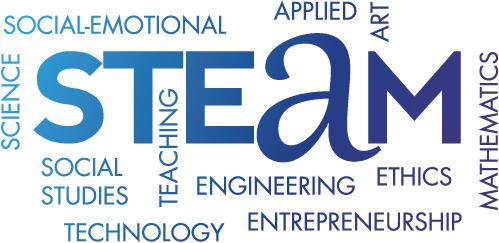Why a comprehensive curriculum matters
Early in the development of the Virginia STEAM Academy, leadership met with the Engineer’s Council at Newport News Shipbuilding, a division of Huntington Ingalls Industries. At some point, the conversation shifted to a dialogue among Council members themselves. “We need more technicians,” argued some. “No. We need more leaders,” said others. The Council members grew more and more animated as they pointed to the immediate and long-term needs of the company. Finally, a Council member broke the volley, turned to Virginia STEAM Academy leadership, and said, “Whatever you do, please send us graduates who can write.” That gave us an opportunity to talk about why a comprehensive curriculum matters – a curriculum that includes English, writing, civics, world languages, global awareness and appreciation, business and entrepreneurship, history, and the arts.
Researchers suggest a certain degree of mathematical maturity is required to fully participate in a 21st-century economy (Peterson, Woessmann, Hanushek, & Lastra-Anadón, 2011). Some might think, then, that a STEM-focused academy is a STEM-exclusive academy. Nothing could be further from the truth. Virginia STEAM Academy leadership holds that those students who appreciate and integrate STEM disciplines with the humanities will be the ones to thrive in an increasingly competitive global society. Late Apple CEO and cofounder Steve Jobs exemplified this idea when he said, “I read something that one of my heroes, Edwin Land of Polaroid, said about the importance of people who stand at the intersection of humanities and sciences [italics added], and I decided that’s what I wanted to do” (Isaacson, W., 2011, p. xix; excerpt from MacFarlane, B. (Ed). STEM Education for High-Ability Learners: Designing and Implementing Programming, in press).
This might be a good time to talk about our name. We sometimes get asked why we departed from STEM and use STEAM. We seek to create a distinctive living and learning experience for our students that blends the content (STEM, humanities, health) within the context of applied learning, real world challenges, sabbaticals, internships, and mentorship opportunities. We hold that deep mastery of content knowledge can occur in multiple environments including and enhanced by integration with authentic, relevant challenges. We are intentional in our use of the “A” to mean “applied” or “art/design.” Perhaps it is STEM with an A that covers it all. Twenty-first century STEAM leaders will apply knowledge within and across the core STEM disciplines (interdisciplinary and trans-disciplinary), and they will understand and integrate the humanities into their full development.

